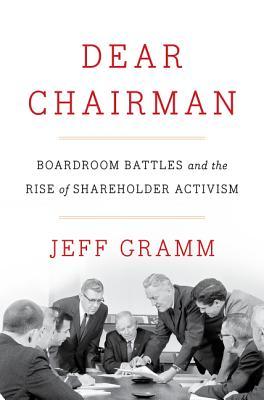 ISBN: 0062369830
ISBN: 0062369830Published: February 23rd, 2016
Publisher: HarperBusiness
Received: Goodreads First Reads
Read from November 21st to 24th, 2016
Synopsis from Goodreads:
A sharp and illuminating history of one of capitalism’s longest running tensions—the conflicts of interest among public company directors, managers, and shareholders—told through entertaining case studies and original letters from some of our most legendary and controversial investors and activists.
Recent disputes between shareholders and major corporations, including Apple and DuPont, have made headlines. But the struggle between management and those who own stock has been going on for nearly a century. Mixing never-before-published and rare, original letters from Wall Street icons—including Benjamin Graham, Warren Buffett, Ross Perot, Carl Icahn, and Daniel Loeb—with masterful scholarship and professional insight, Dear Chairman traces the rise in shareholder activism from the 1920s to today, and provides an invaluable and unprecedented perspective on what it means to be a public company, including how they work and who is really in control.
Jeff Gramm analyzes different eras and pivotal boardroom battles from the last century to understand the factors that have caused shareholders and management to collide. Throughout, he uses the letters to show how investors interact with directors and managers, how they think about their target companies, and how they plan to profit. Each is a fascinating example of capitalism at work told through the voices of its most colorful, influential participants.
A hedge fund manager and an adjunct professor at Columbia Business School, Gramm has spent as much time evaluating CEOs and directors as he has trying to understand and value businesses. He has seen public companies that are poorly run, and some that willfully disenfranchise their shareholders. While he pays tribute to the ingenuity of public company investors, Gramm also exposes examples of shareholder activism at its very worst, when hedge funds engineer stealthy land-grabs at the expense of a company’s long term prospects. Ultimately, he provides a thorough, much-needed understanding of the public company/shareholder relationship for investors, managers, and everyone concerned with the future of capitalism.
Review:
This book isn't on a topic I would typically read about, but I was intrigued enough to enter a giveaway for it. Overall, I found the book interesting, and I learned more about shareholder activism than I'd ever known before.
Despite not knowing much about the topic beforehand, I didn't find the book difficult to understand. I think most people could read it without feeling confused. If there was something presented in the book that I didn't previously know, I felt that it was explained enough or there was enough context that I got what the author was saying.
Some parts of the book were more interesting to read than others, but I'd say that has far more to do with the topic than the book itself. I was surprised that I found some of the stories in the book as gripping as I did. However, there were others were it was very tempting to skip a few pages here or there.
If you're interested in learning more about shareholder activism, I'd say this book is a good first start. It won't be for everyone, but it does a good job for what it is.
I received this book through Goodreads First Reads. This in no way impacted my review.

No comments:
Post a Comment